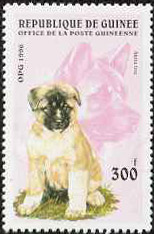
Exploring mechanisms of sex differences in longevity: lifetime ovary exposure and exceptional longevity in dogs
Links between longevity and longer retention of ovaries in Rottweiler bitches
source: David J Waters, Seema S Kengeri, Beth Clever, Julie A Booth, Aimee H Maras, Deborah L Schlittler and Michael G Hayek
Aging Cell vol 8 no 6, December 2009
starts p752, 3 pages long
Studying pet dogs can help in understanding sex differences in human longevity, and it is worth looking at pet dogs to see whether retaining ovaries is linked to longevity. A high proportion of pet dogs have their ovaries removed at varying ages, while young women tend not to have ovaries removed, so it is easier to study dogs to work out the effects of removal at a young age on longevity in mammals. A database was set up for the medical histories of 119 of the oldest Rottweilers (both male and female) in North America. Questionnaires and telephone interviews with vets and owners were used to collect data on the medical history, cause of and age at death. The bitches were spayed, with removal of the ovaries (ovariectomy) carried out at different times in their lives. Rottweilers which survived to age 13 were compared with a group of Rottweilers from the same area which died between 8.0 and 10.8 years, which is more normal for the breed, which has an average expectancy of living to 9.4 years. American Kennel Club records were used to check the date of birth.
More bitches than dogs survived to age 13, though bitches that had had their ovaries removed in the first four years of their lives were no more likely to achieve longevity than were males. In contrast, females who kept their ovaries for over four years were more than three times likely than males to achieve longevity. We looked in depth at 83 exceptionally long-lived bitches, and 100 bitches with more usual longevity and asked whether the length of time bitches kept their ovaries during the first eight years of their lives was linked to better chances of exceptional longevity. We found that bitches which kept their ovaries the longest (between 6.1 and 8.0 years) were 3.2 times more likely to achieve exceptionally long lives than bitches which kept their ovaries for the shortest period. This link between longevity and ovaries was evident even after taking into account other characteristics with a possible influence on longevity, like weight, height, and the age at death of the bitch's mother. The benefits of intact ovaries do not appear to be explained by ovaries protecting bitches against a particular disease. The main cause of death in Rottweilers with normal longevity was cancer, and when we excluded cancer deaths, there was still a strong link between exceptional longevity and retaining ovaries; bitches retaining their ovaries up to the age of seven had a ninefold better chance of achieving exceptionally long lives than bitches retaining their ovaries for the shortest period of time.
This study is backed by results from another group of rottweilers that we have studied, 237 female Rottweilers who died at between 1.3 and 12.9 years. Those retaining their ovaries for the first 4.5 years of their lives showed a 37% lower mortality than bitches undergoing ovariectomy before they were 4.5 years old. We focused on one breed, and took into account how long bitches retained their ovaries rather than simply classing dogs as spayed or entire, in order to pinpoint the role of ovaries in aging, including the importance of how long ovaries were retained. Our results show both that bitches are more likely than dogs to achieve exceptional longevity, and that longevity is linked to the length of time a bitch retains her ovaries.
DO,HD


